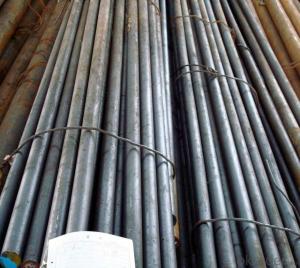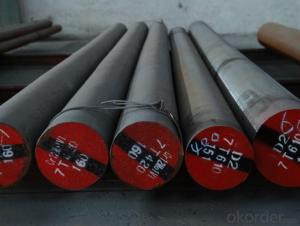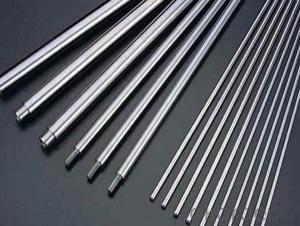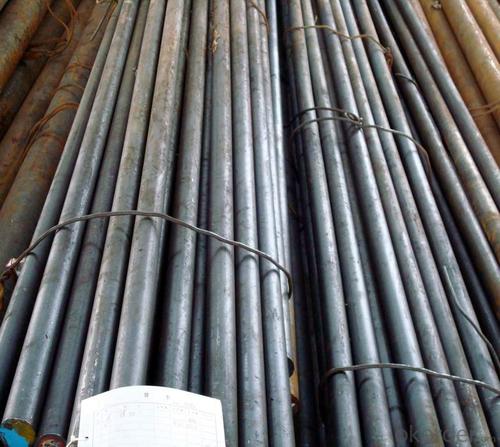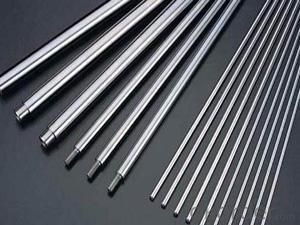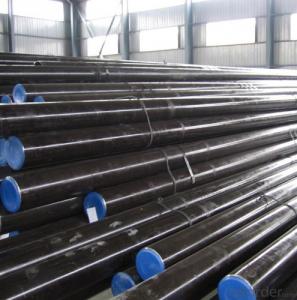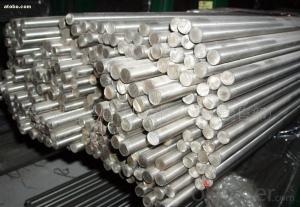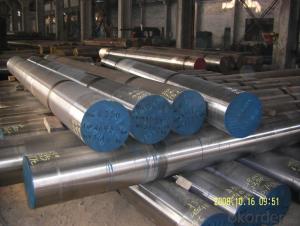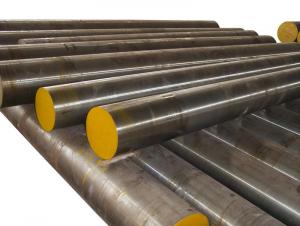High Quality Hot rolled Bearing Steel Bar
- Loading Port:
- China main port
- Payment Terms:
- TT or LC
- Min Order Qty:
- 20 m.t.
- Supply Capability:
- 500 m.t./month
OKorder Service Pledge
OKorder Financial Service
You Might Also Like
Product Description:
OKorder is offering Hot rolled Bearing Special Steel Bar at great prices with worldwide shipping. Our supplier is a world-class manufacturer of steel, with our products utilized the world over. OKorder annually supplies products to European, North American and Asian markets. We provide quotations within 24 hours of receiving an inquiry and guarantee competitive prices.
Product Applications:
Our products have been used in all kinds of areas, such as aviation, aerospace, navigation, nuclear, energy, chemical industry, electronic information, petrochemical, automotive, instrument and meter, Communication ,transportation, and medical instruments, etc. Bearing ring,steel rolling mill ,machinery, 100Cr6 bearing steel ball is widely used in high-speed and low-noise bearing, bicycle, motorcycle, automobile, bags, electronics.
Product Advantages:
OKorder's Hot rolled Bearing Special Steel Bar are durable, strong, and resist corrosion.
Main Product Features:
· Premium quality
· Prompt delivery & seaworthy packing (30 days after receiving deposit)
· Corrosion resistance
· Can be recycled and reused
· Mill test certification
· Professional Service
· Competitive pricing
Product Specifications:
1. Dimensional sizes: Thickness: 14~100mm.Length:3000~5800mm,Diameter :14-500mm
2.Chemical composition:
C | Si | Mn | Cr | Ni | Cu |
Equal or less than | |||||
0.95-1.05 | 0.15-0.35 | 0.20-0.40 | Cr:1.30-1.65 | 0.30 | 0.25 |
3. Grade: SAE51200/ GCr15 / 100cr6
4. Heat Treatment:
Soft annealing: heat to 680-720°C, cool slowly.
Hardness after annealing: Max. 241 HB
Hardening: 820 - 850 °C
Normalizing temperature: 840-880°C
Tempering: 540-680°C
5. Surface requirements: Black, grinding, bright, polish
6. Characters:
1) Comprehensive properties
2) Good performance in cutting and processing after spheroids annealing
3) High hardness and homogenization after quenching and tempering
4) High abrasive resistance and fatigue resistance
7. Payment terms: T/T or L/C at sight
Usage & Applications of Bearing Steel
Our products have been used in all kinds of areas, such as aviation, aerospace, navigation, nuclear, energy, chemical industry, electronic information, petrochemical, automotive, instrument and meter, Communication ,transportation, and medical instruments, etc. Bearing ring,steel rolling mill ,machinery, 100Cr6 bearing steel ball is widely used in high-speed and low-noise bearing, bicycle, motorcycle, automobile, bags, electronics.
Packaging & Delivery of Bearing Steel
Mark: Heat No. will be cold stamped and Steel grade, diameter (mm), length (mm), and the manufacturer LOGO and weight (kg) is painted.
Standard seaworthy packing or as customer required
Delivery time: Within 30 days after order is confirmed.
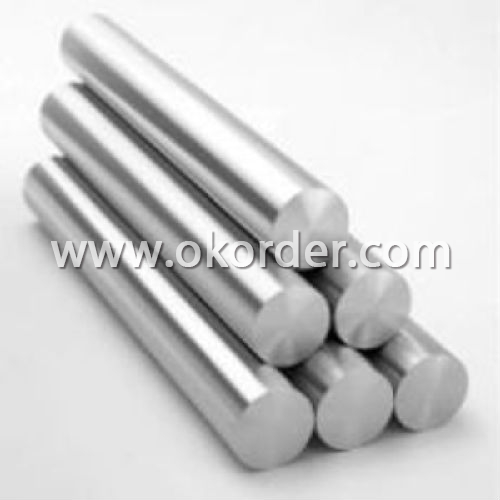
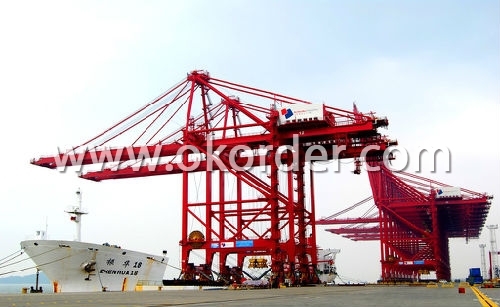
FAQ:
Q1: Why buy Materials & Equipment from OKorder.com?
A1: All products offered byOKorder.com are carefully selected from China's most reliable manufacturing enterprises. Through its ISO certifications, OKorder.com adheres to the highest standards and a commitment to supply chain safety and customer satisfaction.
Q2: How do we guarantee the quality of our products?
A2: We have established an advanced quality management system which conducts strict quality tests at every step, from raw materials to the final product. At the same time, we provide extensive follow-up service assurances as required.
Q3: How soon can we receive the product after purchase?
A3: Within three days of placing an order, we will begin production. The specific shipping date is dependent upon international and government factors, but is typically 7 to 10 workdays.
- Q: What is the purpose of annealing in special steel production?
- The purpose of annealing in special steel production is to improve the steel's mechanical properties and reduce its internal stresses. This process involves heating the steel to a specific temperature and holding it at that temperature for a certain period of time, followed by controlled cooling. Annealing helps to enhance the steel's ductility, toughness, and machinability, making it easier to work with and ensuring consistent and reliable performance in various applications.
- Q: How does special steel contribute to the chemical processing industry?
- The chemical processing industry heavily relies on special steel, which offers a wide range of benefits that enhance the efficiency and safety of various processes. One crucial characteristic of special steel is its high resistance to corrosion, which is vital when dealing with corrosive chemicals. This resistance ensures that equipment and pipelines made from special steel can endure harsh chemical environments without deteriorating, leading to longer lifespan and reduced maintenance costs. Moreover, special steel exhibits exceptional strength and durability, enabling it to withstand the high temperatures and pressures commonly encountered in chemical processing. This strength guarantees that equipment like reactors, heat exchangers, and vessels can function effectively under demanding conditions, minimizing the likelihood of failures or accidents. Additionally, special steel possesses excellent thermal conductivity, making it highly advantageous in heat transfer applications. This property facilitates efficient heat exchange between different fluids, thereby enhancing the overall energy efficiency of chemical processes. By enabling effective heat transfer, special steel optimizes the performance of equipment such as condensers, boilers, and evaporators. Furthermore, special steel is frequently utilized in the construction of storage tanks and pipelines for the transportation and distribution of chemicals. Its remarkable resistance to mechanical stress and impact makes it ideal for ensuring the secure containment and transportation of hazardous substances, reducing the risk of leaks or spills that could have severe environmental and safety consequences. In conclusion, the utilization of special steel in the chemical processing industry significantly contributes to the reliability, efficiency, and safety of various processes. Its resistance to corrosion, strength, thermal conductivity, and durability make it an essential material for equipment and infrastructure, guaranteeing the smooth and secure operation of chemical processing plants.
- Q: What are the main applications of special steel in the electronics packaging?
- The main applications of special steel in electronics packaging include providing structural support and protection for electronic components, ensuring electromagnetic compatibility, heat dissipation, and preventing corrosion.
- Q: How does special steel perform in magnetic applications?
- Special steel, also known as stainless steel, generally performs well in magnetic applications. However, it is important to note that not all types of stainless steel are magnetic. The magnetic properties of special steel depend on its composition and the presence of certain elements such as nickel, manganese, and chromium. Austenitic stainless steel, which is the most common type, is non-magnetic due to its high nickel content. This makes it ideal for applications where magnetic interference is undesirable, such as in sensitive electronic devices or medical equipment. On the other hand, ferritic and martensitic stainless steels, which have lower nickel content, are magnetic. These types of special steel are commonly used in applications where magnetic properties are required, such as in magnetic separators, transformers, and electric motors. It is worth mentioning that the magnetic strength of stainless steel is relatively weak compared to other magnetic materials like iron or nickel. Therefore, if a strong magnetic field is needed, alternative materials may be more suitable. Overall, special steel can perform well in magnetic applications depending on the specific type and composition. It is important to consider the desired magnetic properties and consult with experts or refer to material specifications to ensure the appropriate selection for a particular application.
- Q: How is stainless steel used in the production of kitchen utensils?
- Stainless steel is commonly used in the production of kitchen utensils due to its durability, resistance to corrosion, and easy maintenance. It is used to make a wide range of utensils such as knives, spoons, forks, and pots. The stainless steel material ensures that the utensils remain rust-free, food-safe, and long-lasting, making it ideal for daily cooking and food preparation.
- Q: Can special steel be used for aerospace engine components?
- Yes, special steel can be used for aerospace engine components.
- Q: How does special steel contribute to the overall strength and durability of structures?
- Special steel contributes to the overall strength and durability of structures in several ways. Firstly, special steel is manufactured using specific alloying elements that enhance its mechanical properties, such as increased tensile strength and hardness. This makes it capable of withstanding higher loads and pressures, ensuring the structural integrity of the building or infrastructure. Moreover, special steel is known for its excellent corrosion resistance, which is crucial for structures exposed to harsh environmental conditions or in contact with corrosive substances. By preventing rust and degradation, special steel prolongs the lifespan of structures, reducing maintenance costs and the need for frequent repairs or replacements. Additionally, the unique properties of special steel allow for the creation of more streamlined and lightweight structures. Its high strength-to-weight ratio enables architects and engineers to design structures with thinner sections and reduced material usage without compromising strength. This not only saves costs but also minimizes the environmental impact associated with construction. Furthermore, special steel possesses exceptional toughness and impact resistance, making it highly resistant to fractures or buckling under extreme loads or dynamic forces. This property is particularly crucial for structures subjected to seismic events, heavy vibrations, or impacts, as it ensures the safety and stability of the building or infrastructure. In summary, special steel plays a vital role in enhancing the overall strength and durability of structures. Its unique mechanical properties, corrosion resistance, lightweight nature, and high toughness contribute to the longevity, safety, and cost-effectiveness of buildings and infrastructures.
- Q: How does special steel perform in terms of magnetic permeability?
- Special steel typically has low magnetic permeability, meaning it does not easily allow the flow of magnetic fields through it. This property makes it suitable for applications where magnetic interference needs to be minimized or controlled, such as in electrical transformers or magnetic shielding.
- Q: What industries commonly use special steel?
- Special steel, also known as alloy steel, is widely used in various industries due to its exceptional properties and performance characteristics. Some of the industries that commonly utilize special steel include: 1. Automotive Industry: Special steel is extensively used in the manufacturing of components for automobiles, such as crankshafts, camshafts, gears, and axles. Its high strength, durability, and excellent heat resistance make it ideal for withstanding the demanding conditions of the automotive sector. 2. Aerospace Industry: Special steel finds applications in the aerospace industry for manufacturing critical components like turbine blades, landing gear, and structural parts. Its ability to withstand high temperatures and maintain structural integrity under extreme conditions is crucial for aerospace applications. 3. Oil and Gas Industry: Special steel is vital in the oil and gas sector for applications like drill bits, valves, pipelines, and offshore platform components. Its corrosion resistance, high strength, and resistance to extreme temperatures and pressures make it suitable for these demanding environments. 4. Construction Industry: In the construction industry, special steel is used in the fabrication of structural components, reinforcement bars, and high-rise building frameworks. Its high tensile strength, toughness, and resistance to wear and tear ensure the safety and stability of the structures. 5. Tool and Die Industry: Special steel is widely used in the tool and die sector for manufacturing cutting tools, molds, dies, and various machine components. Its ability to retain sharpness, resist deformation, and withstand high pressures and temperatures make it indispensable for these applications. 6. Energy Industry: Special steel is extensively used in power generation plants, including nuclear, thermal, and renewable energy facilities. It is used for manufacturing turbines, boilers, heat exchangers, and other critical components due to its high temperature and corrosion resistance properties. 7. Medical Industry: Special steel plays a crucial role in the medical field, especially in surgical instruments and implants. Its biocompatibility, strength, and resistance to corrosion make it suitable for applications like joint replacements, dental instruments, and surgical cutting tools. 8. Manufacturing Industry: Special steel is widely used in various manufacturing processes, such as machining, forging, and casting. It is employed in the production of machine tools, industrial equipment, and heavy machinery components due to its high strength, toughness, and versatility. These are just a few examples of the industries that commonly utilize special steel. Its unique properties make it an essential material for a wide range of applications, where strength, durability, heat resistance, and corrosion resistance are critical factors.
- Q: Can special steel be used in the manufacturing of consumer goods?
- Indeed, the utilization of special steel in the production of consumer goods is possible. Special steel refers to a specific type of steel that has been engineered to possess exceptional properties, such as increased strength, corrosion resistance, heat resistance, or wear resistance. These enhanced characteristics render it suitable for a broad range of applications, including the manufacturing of consumer goods. Consumer goods encompass a diverse array of products, ranging from kitchen appliances and electronics to automobiles, tools, and furniture. Special steel can be employed in various components and parts of these goods to enhance their performance and durability. For instance, in kitchen appliances, special steel can be utilized to fabricate blades, heating elements, or cooking surfaces, thereby improving cutting efficiency, heat distribution, and resistance to corrosion. In electronics, special steel can be employed in the production of casings, connectors, or springs to ensure durability, conductivity, and resistance to temperature fluctuations. Furthermore, special steel can also find application in the manufacturing of consumer goods that demand high precision and reliability. In the automotive industry, for example, special steel can be used for engine components, chassis, or safety features, providing superior strength, impact resistance, and structural integrity. Likewise, in the production of tools and equipment, special steel can be employed to manufacture drill bits, cutting tools, or machine components, guaranteeing longevity, precision, and optimal performance. In conclusion, special steel offers distinct advantages over conventional steel due to its unique properties, making it an ideal material choice for the production of consumer goods. Its enhanced strength, corrosion resistance, heat resistance, or wear resistance characteristics can significantly enhance the performance, durability, and reliability of consumer products, thereby meeting the demands and expectations of consumers.
Send your message to us
High Quality Hot rolled Bearing Steel Bar
- Loading Port:
- China main port
- Payment Terms:
- TT or LC
- Min Order Qty:
- 20 m.t.
- Supply Capability:
- 500 m.t./month
OKorder Service Pledge
OKorder Financial Service
Similar products
Hot products
Hot Searches
Related keywords
